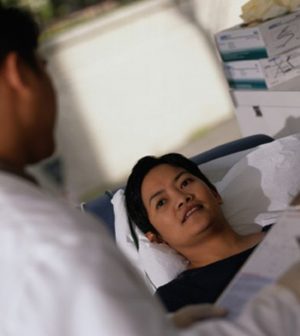- Could Your Grocery Store Meat Be Causing Recurring UTIs?
- Are You Making This Expensive Thermostat Error This Winter?
- Recognizing the Signs of Hypothyroidism
- 10 Strategies to Overcome Insomnia
- Could Artificial Sweeteners Be Aging the Brain Faster?
- Techniques for Soothing Your Nervous System
- Does the Water in Your House Smell Funny? Here’s Why
- Can a Daily Dose of Apple Cider Vinegar Actually Aid Weight Loss?
- 6 Health Beverages That Can Actually Spike Your Blood Sugar
- Treatment Options for Social Anxiety Disorder
Many Oncologists in the Dark About LGBTQ Health Needs

Most cancer specialists are comfortable treating LGBTQ patients, but many aren’t confident in their knowledge about these patients’ specific health needs, a new survey finds.
“Cancer care within the LGBTQ community is a largely ignored public health issue,” said Gwendolyn Quinn, a professor in the Departments of Obstetrics and Gynecology and Population Health at NYU Langone Health in New York City.
“To address this problem, we have to start by understanding the gaps in knowledge among physicians,” Quinn added in an NYU news release.
The survey included 450 oncologists at the 45 U.S. National Cancer Institute-designated cancer centers in the United States. They were asked about their knowledge, attitudes, behaviors and willingness to be educated about LGBTQ cancer patients.
The majority said they were comfortable treating lesbian, gay or bisexual patients, but only half felt confident in their knowledge of these patients’ health needs. The survey also found that nearly 83 percent said they were comfortable treating transgender patients, but only 37 percent felt they knew enough to do so.
Most respondents said they were interested in learning more about LGBTQ patients.
Political affiliation and having LGBTQ friends or family were associated with greater knowledge and interest in education, according to the study published Jan. 16 in the Journal of Clinical Oncology.
Members of the LGBTQ community are at greater risk for certain types of cancer such as cervical and oral, according to the study authors. They also said that previous studies show that members of LGBTQ community are less likely to get screened for cancer but more likely to engage in behaviors that increase cancer risk, such as drinking or smoking.
Along with providing a safe environment for patients to disclose their sexual orientation and gender identity, cancer centers should also establish protocols for treating LGBTQ cancer patients, the study authors added.
“Oncologists and other cancer care providers need to consider sexual orientation and gender identity when assessing the needs of a patient,” Quinn said. “At the institutional level, education and further training should be offered to physicians so they can be both culturally sensitive and clinically informed about LGBTQ cancer issues.”
The researchers also said that more LGBTQ people need to be included in health research to improve understanding of their health risks and needs.
More information
The U.S. Centers for Disease Control and Prevention has more on LGBT health.
Source: HealthDay
Copyright © 2026 HealthDay. All rights reserved.










